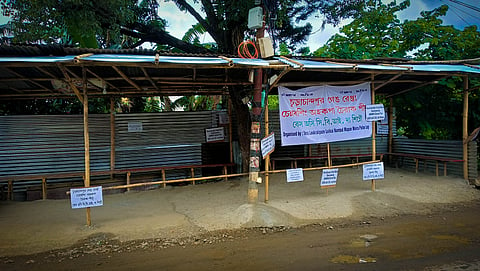
Imphal— In the heart of Manipur is its capital Imphal, a city teeming with cultural diversity and history, a recent eruption of violence has cast a shadow over the lives of its residents. Nearly three months have elapsed since the clash between the Kuki and Maitei communities ignited, setting off a cauldron of discord that reverberated throughout Manipur.
Yet, as one strolls through the bustling streets of the state capital, an air of semblance seems to have returned. Essential shops adorn the streets and the lively Imphal market radiates a renewed spirit. Despite this, a nighttime curfew remains, a precautionary measure for security reasons.
Setting out with resolve, The Mooknayak team embarked on a mission deep into the core of the issue. Our intention was resolute: to transcend the boundaries of mere numbers and analytical reports.
Our journey led us to ground zero, where we aimed to uncover the human stories concealed beneath the surface, stories that often defy quantification in statistical terms.
" What the Eyes Cannot Grasp, the Heart Can Truly Feel !"
Khaidam Subsas, a forty-two-year-old denizen of Moyrong Thong, a residential enclave within Imphal, embarked on constructing his dream abode a few days prior to the outbreak of violence. The conflict had inadvertently disrupted the flow of construction materials, leaving Subsas and many others grappling with scarcity.
Subasas tells The Mooknayak, "The fear has subsided a bit now. It is a little fine here (Imphal city) but our people who are in the mountains have a lot of problems in front of them. The situation was very bad 2-3 months ago. When we started building houses, all this happened. There is no construction material in the shops here, due to which the workers have also returned to their homes due to the closure of work. Talking about the labourers who are from the city and come to work in Khaidam, he says, "The workers are finding it difficult to find because they have to return home early. There is a curfew here in the evening", he says, "the children are going to school hardly once or twice a week, being given leave by the schools for other days".
Notably, the curtain of curfew was drawn across Manipur in the aftermath of the violence, necessitating the deployment of over forty thousand security personnel, including soldiers and paramilitary forces. The twilight hours are governed by curfew, from 6 p.m. to 5 a.m., during which only medical facilities are operational. Attendance at school has become sporadic, a mere once or twice a week, as schools accommodate the reality of life under curfew.
Tiken Sharma, a sixty-year-old proprietor of a neighborhood shop, shares the palpable aftermath of the violence on his business. Formerly bustling with customers from near and far, the shop now witnesses only a trickle of footfall.
"Right now, the prices of everyday commodities like pulses, sugar, milk, potatoes, tomatoes etc. have increased. Because since the incident in the hill, things coming from outside have been limited. In the early days of violence, people were not allowed to come out of their houses at all. Those who had the goods available at that time sold them at double or thrice the actual price and made profits," Tiken Sharma told The Mooknayak. The supply chain disruptions have led to shortages and price hikes, leaving vendors like Sharma struggling to navigate these challenging times.
Imo Sharma, a retired government teacher who used to instruct English and Social Studies to Class 10 students in a government school, now finds himself in a different landscape. With Class 12 classes underway, there is a notable absence of nursery schools having reopened. The anticipation, however, is that they will resume operations soon. This is because the presence of a significant number of army forces has necessitated the transformation of the school premises, where the children once studied.
"The disruption caused by the dispute has severed the supply lines of goods from outside the state. Consequently, the availability of everyday essentials has dwindled, affecting the accessibility of necessary items for the local populace," explains Imo Sharma to The Mooknayak. The government is currently reliant on private trucks and specialized transportation for the transportation of goods. These goods undergo stringent scrutiny at the state border, overseen by vigilant security forces.
In a promising development, Sharma reveals that government offices are gradually resuming their operations. People are slowly returning to their official routines and responsibilities, marking a step towards restoring a sense of normalcy in the midst of ongoing challenges.
The Mooknayak met Poitang , a 45-year-old man who supports his family by maneuvering an electric e-rickshaw in the bustling precincts of the Imphal market. Setting off from his home at 9 a.m. each day, he embarks on a quest to secure passengers. However, the tides have shifted.
In what were once ordinary times, Poitang would typically rake in a daily income of Rs 800 or even more. Yet, since the onset of the ethnic violence incident, the narrative has changed dramatically. The number of passengers has dwindled significantly, casting a pall over his earnings. Presently, his daily income hovers around Rs 300—a stark contrast to the financial security he once enjoyed.
Notably, the indomitable spirit of Manipur's women shines through as they take the reins of commerce. A remarkable phenomenon unfolds across the capital, with women steering vegetable stalls, clothing boutiques, roadside markets, and even domestic enterprises. From haggling over prices to overseeing both modest and grand establishments, these women exemplify resilience, courage, and a determination to secure not only their own livelihoods but also that of their families.
In the face of uncertainty, the intricate web of Manipur's society weaves a tale of resilience, adaptation, and the unwavering spirit that propels a community forward, even in the midst of adversity.
Story Translated by Geetha Sunil Pillai
You can also join our WhatsApp group to get premium and selected news of The Mooknayak on WhatsApp. Click here to join the WhatsApp group.